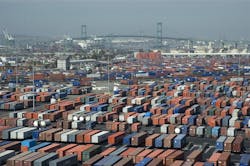West Coast Port Dispute Hurting Asian Supply Chains
Japanese companies with North American plants are having to address the impact that the West Coast port shutdown is having on their ability to get parts from Asia.
While loading and unloading of cargo vessels at all 29 West Coast ports, halted since Friday night, did re-open Tuesday, there is a huge backlog.
These ports handle nearly half of all U.S. maritime trade and more than 70% of imports from Asia. The inability to get essential parts is having an impact on auto manufacturers.
On Sunday Honda announced that it needs to slow production at plants in Ohio, Indiana and Ontario, Canada, for a week as parts needed for the Civic, CR-V and Accord have been held up due to the dispute.
"We do not have a sufficient supply of several critical parts to keep the production lines running smoothly and efficiently," Honda spokesman Mark Morrison said, as reported by Reuters.
Toyota Motor Co. said it has "adjusted overtime at some manufacturing plants in North America" by cutting some hours, but it has increased production in at least one, the Tacoma pickup factory, "to minimize production disruptions," as reported in USA Today.
Nissan wasn’t feeling the effect as much due to the fact that about 85% of its U.S. sales comes directly from plants that are manufacturing in North America and they are supplied locally.
To address the issue, some automakers are using air freighters to transport some crucial parts from Asia to their U.S. factories. Fuji Heavy Industries Ltd, which manufactures Subaru cars, said it would continue flying parts to its U.S. factory beyond an initial arrangement through the end of February, which it previously said would cost an extra 7 billion yen ($59 million) a month.
However, shipping by air is far more costly and will cut into profits.
Hope of a settlement increased as U.S. Secretary of Labor Thomas Perez arrived in San Francisco Monday to help settle the months-long negotiations between the dockworkers union and a maritime association.
